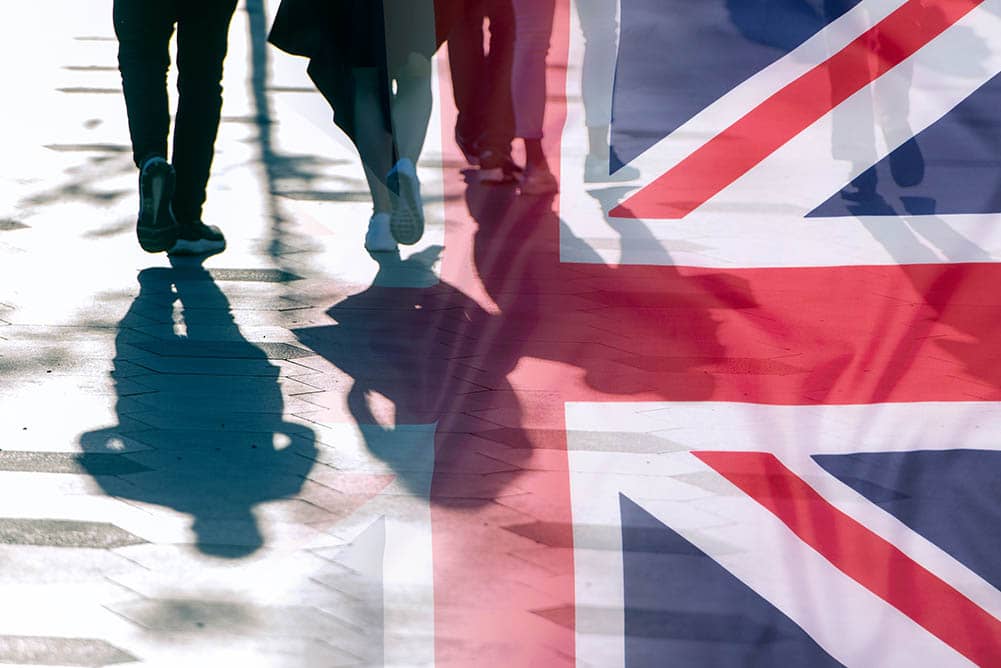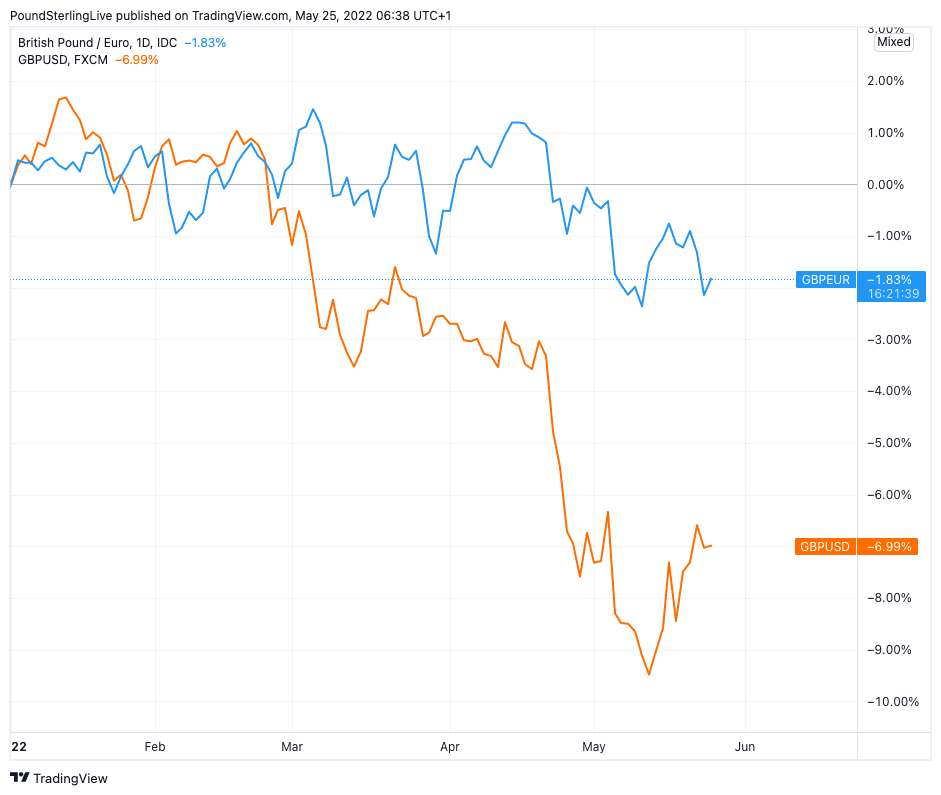Pound Sterling Faces a Summer of Weakness say Analysts
- Written by: Gary Howes
- PMI data sends shockwaves
- Slowing UK economy to weigh on GBP
- GBP "the weakest currency in Europe" - Soc Gen

Image © Adobe Stock
Analysts warn of a summer of Pound Sterling weakness against the Euro, Dollar and other major currencies as the UK economy suffers a downturn and the Bank of England abandons its interest rate hiking cycle.
Most analysts are predicting the Pound will remain pressured against the Dollar and GBP/USD that could result in a test of the 1.20 level, or even go below.
They also say the Pound's rise against the Euro might now have come to an end, meaning the Pound to Euro exchange rate's peak of 1.2188 in March was a high-water mark.
This makes for a rude turn in events for those hoping to sell their Pounds; the UK currency is now already registering a 1.86% loss against the Euro for 2022, while losses against the U.S. Dollar stands at 7.40%.
"The risk of stagflation in the UK is a real danger and an ongoing drag for GBP. GBP fell across the board and Gilts outperformed after the UK composite PMI showed the economy almost grinding to a halt in May," says analyst Elias Haddad at CBA.
Above: GBP is down against the EUR and USD in 2022.
Sentiment towards Pound Sterling took another significant knock this week after data out of the UK showed economic activity deteriorated significantly in May.
The S&P Global Composite PMI release for May came in at 51.8, below the expected 56.5 and the previous month's 58.2.
Such a drastic fall from one month to the next is nearly unprecedented: the month-on-month loss of momentum in May was the fourth-largest on record and exceeded anything seen prior to the pandemic.
The Pound sunk on the news: the Pound to Euro exchange rate was down 0.80% in the minutes following the release at 1.1666, the Pound to Dollar exchange rate overturned a positive start to the day to go 0.60% lower to 1.2495. (Set your FX rate alert here).
Bilal Hafeez at Macro Hive says fundamentals still point to Sterling weakness: "High inflation, a too-cautious Bank of England, and global risk aversion could see further GBP weakness," he says in a recent market commentary for CME Group.
Compare Currency Exchange Rates
Find out how much you could save on your international transfer
Estimated saving compared to high street banks:
£2,500.00
Free • No obligation • Takes 2 minutes
ONS data showed RPI measures of inflation reached 11.1% in April and 9% on a CPI measure.
"These are among the highest inflation rates in the developed world," says Hafeez.
He says it also means that UK CPI inflation has now overtaken the US rate (8.3%) for the first time since mid-2020.
But from a foreign exchange perspective the policy response between the Bank of England and the Federal Reserve is significant.
The Fed is "increasingly hawkish and willing to tip the U.S. economy into a recession, while the BoE is prevaricating over fears of slowing the UK economy too much. As a result, the Fed is expected to hike by a total of 100bps at its next two meetings in June and July, while the BoE is only expected to cumulatively hike by 70bps at their June and August meetings," says Hafeez.
Macro Hive expects the Bank of England is likely to pause and reassess the situation with their updated Monetary Policy Report forecasts in August.
"A relatively more dovish BoE could see further weakness in GBP," says Hafeez.
Even the European Central Bank is sending more 'hawkish' signals following this week's warning from President Christine Lagarde that rates would rise in July and again in August.
"As the market reacts to Christine Lagarde's ECB Policy roadmap, it's much easier to see sterling as the weakest currency in Europe," says Kit Juckes, Head of FX Research at Société Générale.
GBP to USD Transfer Savings Calculator
How much are you sending from pounds to dollars?
Your potential USD savings on this GBP transfer:
$1,702
By using specialist providers vs high street banks
Pound Sterling is now "the weakest currency in Europe," says Juckes, adding the market is defaulting to buying Euros and selling Pounds as an "easy default" to the recent change in ECB policy.
UK consumer confidence is now at all-time lows according to GfK's measures, despite labour market tightness.
Pound Sterling Live published an article last week covering research that showed plummeting consumer confidence does not always result in recession.
Furthermore, other economists say the UK economy should avoid such a dire outcome were employment to remain robust.
But Hafeez points out the UK current account deficit is also deteriorating, which further undermines the currency, particularly when market volatility and credit market weakness are aiding flows into the dollar and away from the pound.
"Together, these factors could see GBP/USD resume its weakening trend and touch its 2019 low of 1.20 in coming months," says Hafeez.





